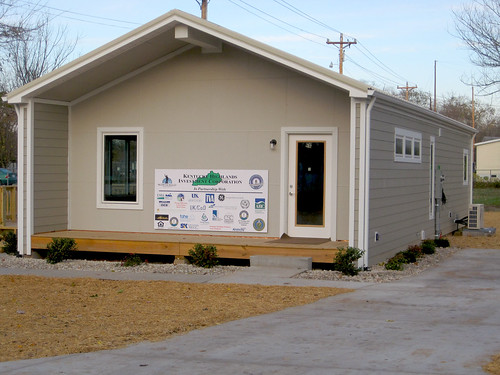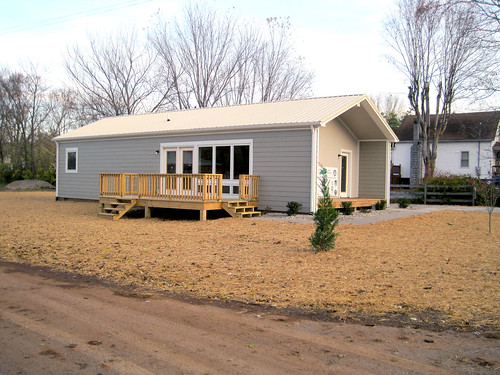
A ribbon cutting was held last month, for the first prototype from the University of Kentucky’s (UK) Houseboat to Energy Efficient Residences (HBEER) initiative in an established residential area near downtown Monticello, Kentucky. The HBEER initiative has created green jobs and is bringing back 575 skilled workers and 1,000 related jobs that were lost in the houseboat manufacturing and marine industries due to the economy.
HBEER is a partnership between the UK College of Design, the Center for Applied Energy Research at UK, the Kentucky Highlands Investment Corporation (KHIC) and the Kentucky Housing Corporation (KHC). HBEER has received financing from the U.S. Department of Energy through the Kentucky Department of Local Government and the Kentucky Energy and Environment Cabinet, the U.S. Department of Agriculture, the Appalachian Regional Commission, U.S. Department of Housing and Urban Development, the U.S. Commerce Department’s Economic Development Administration, Rural Local Initiatives Support Corporation and UK.
USDA Rural Development has worked with KHIC throughout the project, awarding the company a Rural Business Enterprise Grant which was used to establish a revolving loan fund. That fund was used to supply some of the working capital used by Stardust to build the prototype. KHIC also is working with Rural Development’s Single Family Housing Program to assist potential homeowners obtain financing for HBEER properties.

The multi-year project was initiated in the fall of 2009 and directly responds to the impact the current economic downturn has had on the houseboat manufacturing industry in Kentucky. More than 50 students and faculty at the college’s School of Architecture were responsible for researching and developing initial models of energy-efficient, affordable housing that could be produced by the region’s houseboat manufacturers.
Highlights of the HBEER project include:
- Estimated energy costs at current rates are expected to be about $1.65 per day, which is one-half to one-sixth of energy bills for other housing alternatives.
- More than 80 percent of the home value is derived from products made in Kentucky and Kentucky labor, which further increases the jobs created or saved.
When the partnership began in 2009, Stardust Cruisers had 12 full-time employees and 12 contract workers. It now has 56 full-time employees, including six who are dedicated to the HBEER project. As a result of this project, Stardust also has improved the energy efficiency of its houseboats and is one of the few houseboat manufacturers exporting new products.

The next phase of the HBEER project will include a prototype for multifamily housing as well as classroom space for schools that will serve as an energy efficient and more durable alternative to portable classrooms.
USDA provides low interest home loans to credit-worthy, income-eligible rural residents. To find out more, contact any USDA Rural Development office or click here.
